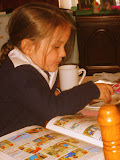
Not everyone thinks so, though. If you know where to look, you can easily find early Latin readers, from "Quot Animalia" (How many animals) by Marie Carducci Bolchazy aimed at the preschool set, to Fables from Aesop, to translations of The Cat in the Hat, Winnie the Pooh, and even Asterix and Obelix and Harry Potter! So someone is doing it.
We don't know of anyone locally (that we're aware of -- one or two people we know seem like they might, though we haven't discussed it) but I know quite a few homeschoolers out in the great wide 'net who are studying Latin with their kids.

Are we just "showoffs"? Isn't Latin too difficult for small children? Hmmm...well, Roman kids did ok. But, yes, the way it's generally taught in high school would be too dry and boring to keep a six year old's interest. It can be done in a really fun way, though, making it no more difficult than any modern language.

The question I want to ponder here, though, is ...why?
What are the reasons one might want to study a language that they will never speak socially?
I have heard the argument that Spanish, Chinese, and Arabic would all be better choices. Truth is, we have explored a bit of Arabic, and we also play with Spanish and Swedish.
In my opinion, Latin is not "instead" of modern languages, it's the basis for a more extended study of language. Our goal is not to be fluent in any of them. That can come later, wit interest.

Our goal is to become conversant enough in a variety of languages to recognize them wen we find them, and to recognize some similarities. Fluency is likely, eventually, in Swedish and Spanish, just because we have the opportunity to experience those socially.

Our goal is to become conversant enough in a variety of languages to recognize them wen we find them, and to recognize some similarities. Fluency is likely, eventually, in Swedish and Spanish, just because we have the opportunity to experience those socially.
But the point, in my opinion, to studying Classical Latin and Greek is, first of all, it's fun. It's fun because it lets us in on the secret code used everywhere and almost unnoticed in our culture. It's like the experience Percy Jackson has as he approaches the gate to the camp and the letters rearrange themselves before his eyes...!
When you start to study Classical languages, suddenly, the lettering on the state flag begins to take meaningful shape. Botanical, biological, and zoological names become more than disjointed sounds, and best of all, we start to see them everywhere in our own language!
In the long run, the inflected language training will make it far easier for Jack to study English grammar, which is, after all, based directly (and nonsensically) on Latin. It will broaden and deepen his vocabulary in many languages.
And what better time to learn a "difficult" language than when his brain is specifically receptive to language?
Take Canis. Dog. Canine teeth --> dog teeth. The teeth we use for tearing meat. Huh. Cool!
And it happens over and over again all day long. It's a constant source of discovery. (It can also make a cool "secret code" for talking discretely in public...and just about every parent knows how useful those are!)
I know there's probably more, but I want to hit the shower and get to work. ;) If anyone has suggestions for more reasons to study Latin, please do feel free to add them. I named this for maximum Google hits, since I didn't find much about *why* other than reading the Bible, and I'd like it to be as useful as possible.











I talked Charles into taking Latin in HS - I think he is still very happy that I did that (one of the few things ;) ) as it is a building block for so much! He is aiming at being a HS English teacher!
ReplyDeleteKnowing Latin is a wonderful basis for understanding botany/herbs, and it's a perfect foundation for understanding medicine. You can't ask for a better 'cheat sheet' in the biological sciences than coming in knowing Latin. My Anatomy and Physiology professor hit me up for the medical Latin course I found online, when she saw me reading my copy.
ReplyDelete